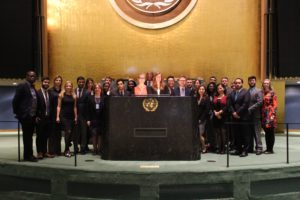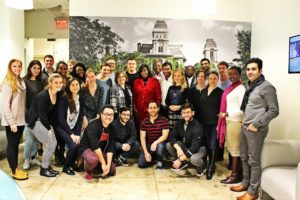After almost 8 months here in Maxwell School, I now have a clear idea of it works; what the program expect from students, and how far we can be shot away into greatness. As you know, it’s the first public administration school in the country, and the number one for 21 consecutive years.

After studying Communications in Peru and International studies in Barcelona, I can say that, even while quality is hard to measure, this program is clearly more demanding and asks for more participation. Stating that Barcelona was more relaxed than Peru, while not as academically rigorous, it gave me the freedom to explore deeper some particular topics.
So, during my time here I have been thinking, not only about teaching styles, but about how education can help you to achieve all your working goals. We can think about how people like Bill Gates or Mark Zuckerberg dropped out school and achieved so much, while every serious research says that higher education is the safest investment you can make.
Going to the root of the problem, some assure that is not about schools, but how some schools build their teaching styles. For Sir Ken Robinson, education is still the model made up for industrial needs two centuries ago. Where you should only be good in what you are told: stigmatizing other capacities that challenge the status quo.
Let’s think about Finland, how a couple of decades ago was only one more northern European country in terms of education, and now is one of the best in the world, competing with Asian countries and spending less time studying. The secret of Finland is no longer a mystery; they make students enjoy school. Malcom Gladwell said about success: “Nothing happens without desire and passion. Otherwise, nothing else falls in place.”
Furthermore, Finland is taking things to a whole new level. They want to change their system, taking out school subjects and instead having challenges to achieve, where students will need to use cross-subject knowledge, and their personal abilities as team members. A Sen learning say: “The obstacle is the path.”
This is a very important issue, there’s an analogy attributed to Einstein that says: if you judge a fish by its ability to climb a tree, it will live its whole life believing that it is stupid. That’s how Howard Gardner came up with the theory of Multiple-intelligences, which is now the most respected by the scientific community: Linguistic, Logical/mathematical, Visual/spatial, Musical, Bodily kinaesthetic, Interpersonal, Intrapersonal, Naturalist. Ask yourself which one’s you master.

In my opinion, this approach should be considered also for higher education, as in the real-world teams are built up by people with different abilities that complement each other. This is also the case of institutions and companies that are seeking shareholders to improve their overall impact and be more effective with resources. Moreover, critical thinking and creativity should also be more emphasized, as they keep organizations ahead in the marketplace, and can really achieve the changes we want in the world.
For most respected researchers, the future of administration will be based on psychology and leadership: how to understand others, and how take out the best of them. While the future of public administration seems a little blurrier as there are challenging ideological positions. For me, will be about how to be adaptable in this everchanging environment, with all its new possibilities. Considering science, empowerment of the poor, and partnerships with other actors that could bring solutions to achieve a sustainable development for nations.
While Maxwell School is not the perfect place to study (and any place will be), I can say that is one of the best, and you will find your own reasons why. What I can tell you is that you will be defied from the very start, not only to challenge what others said before you, but to challenge yourself.
Here you could find: Some of the best Professors available always ready to guide you. Intrinsic institutional values based on reshaping the world for a better society. Interaction with some of the brightest people from all around the world, that carry those same values.
We should never underestimate the power of connections, as it’s what this world is made of, and nothing is more important than what motivates us to achieve our goals.
Think about Maxwell if you feel prepared to make a real impact in the world.
Isn’t that why we are all here?
Socrates said: “Education is the kindling of a flame, not the filling of a vessel.”



